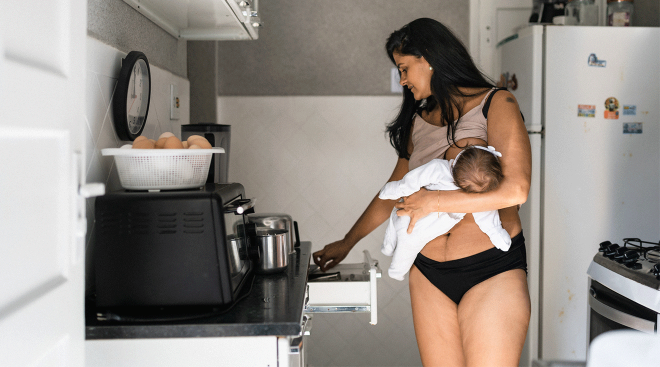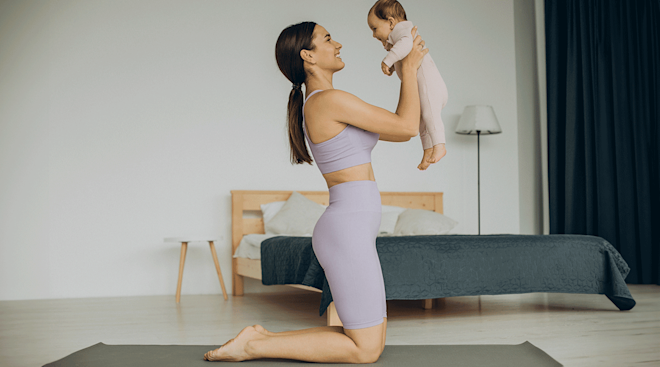Why Moms Need to Shift Their Perspective on Asking for Help
Mental health is a critical component of maternal health. But with all the expectations society has for mothers, prioritizing self-care is often easier said than done. Many moms are responsible for their 9 to 5 jobs, caring for kiddos, managing the household, scheduling family activities, the list goes on. With so much to do at all times, it’s no wonder we need help—and a lot of it. Yet some women, burdened with the expectation to “do it all,” feel like they can’t reach out for help even when they really need it. Here, we spoke to meditation and mindfulness expert Josephine Alturi to understand why it can be hard for mothers to seek help, and how to overcome those feelings.
While roles are slowly shifting, society has historically placed the task of raising a family largely on mothers. “A lot of our identity [growing] up as women is this idea that we are the ones who are able to create life, and then we are the ones who care for life,” Alturi says. As a result, many women subconsciously hold onto this notion as they become parents and feel a sense of shame when they somehow stray from those expectations. “We try to do everything ourselves, and when we do finally reach out for help, there is a modicum of self-guilt and perhaps unworthiness tied around that,” Alturi says. “You feel like you’re not able to perform the simple things that you’re meant to do as a woman, as a mother.” But it’s a flawed line of thinking that we have to unlearn. To get around these feelings, Alturi reminds mothers to give themselves grace when asking for help and remember why it’s important to ask for help: to ensure their own well-being, as well as the well-being of their families.
In the same way you’re able to tune into the needs of your children and partner, it’s equally important to tune into your own needs, feelings and limitations—and to communicate them to others. Ultimately, this will not only help you, but it’ll help the whole family. “If the idea that [asking for help] is a sign of weakness and shows you can’t handle things, perhaps look at it through a different lens,” Alturi says. “Look at it as a form of taking care of your family, as a form of self-love, as a sign of strength. You’re helping out your family by doing that asking—and that benefits everyone.” Plus, it also helps teach your kids the valuable lesson that we all need help sometimes, and it’s okay to ask for it.
To help moms better communicate their feelings and needs, Alturi recommends practicing daily check-ins. Take a moment every day to gauge how you’re feeling and what situations are prompting those feelings. This can help provide emotional clarity and, in turn, can help mothers better advocate for themselves. She also recommends the following tips:
Use the four P’s
Take your daily check-ins a bit further with Alturi’s 4P methodology, which stands for pause, perspective, pivot and presence.
- Pause. The first step in this process is to pause and figure out what’s happening and how it’s causing you to feel. If you feel stressed, anxious or angry, it can be helpful to take some deep breaths to regulate your stress levels and move out of a triggered fight-or-flight state, Alturi says.
- Perspective. The second step is to gain perspective and identify the steps you need to take to feel better and provide space for prioritizing your mental health.
- Pivot. Once you’ve done that, pivot to actually incorporate self-care into your daily schedule. “It can be a mental or emotional pivot, where maybe you try a mindfulness strategy, like gratitude or affirmation,” Alturi says. ”Or, it can be a physical pivot where you move yourself out of the situation by physically moving and going out for a walk or seeing your therapist or going over to your partner to have a conversation.”
- Presence. The last step is presence, which is a state that allows you to reap the benefits of the work you’ve done with the first three steps. Be present with yourself and take the space you need to refill your cup.
Set clear boundaries and expectations
Asking for help can be challenging—and dealing with a well-intentioned loved one who may have overstepped boundaries in trying to offer assistance can make it all the more difficult. “This can lead to frustration and not wanting to ask for help anymore,” Alturi says. The best way to combat this is to be as clear as possible about what your needs and requests are. Alturi also advises using “I” statements to explain how you’re feeling. She gives the example: “‘I feel overwhelmed because of XYZ. Can you help me with this?’ When you’re asking that second part of ‘Can you help me with this,’ that’s your opportunity to set boundaries to make it clear what it is that you’re asking for.” This aligns expectations so neither party gets frustrated or has a negative experience, Alturi adds.
While society is slowly beginning to speak out about the invisible labor of mothers, moms can’t wait. To ensure their happiness and wellbeing, moms need to advocate for their needs, even when it’s hard—and changing how you view asking for assistance can go a long way. Accepting help doesn’t make you a bad mom, it makes you a better one. Let go of the guilt and remind yourself that prioritizing your mental health will not only help you, it’ll also help your family in the long run, and that you’re still doing an amazing job.
About the expert:
Josephine Alturi is an expert in meditation and mindfulness, as well as a fertility and parenting coach. She’s a mom to seven and created her family through in-vitro fertilization, international adoption and surrogacy. She uses this personal experience to inform her work. A graduate of the University of Chicago, Alturi is also the host of the podcast “Responding to Life: Talking Health, Fertility, & Parenthood,” as well as the author of Mindfulness Journal for Parents and 5 Minute Mindfulness for Pregnancy.
Plus, more from The Bump:
Navigate forward to interact with the calendar and select a date. Press the question mark key to get the keyboard shortcuts for changing dates.





















































